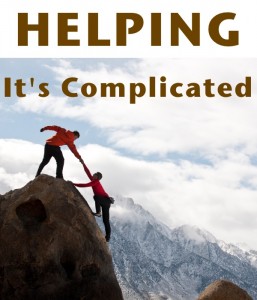 Most of us want to help. It is in our new nature in Christ. We see a need and we want to do something about it. We feel for people who hurt and we can’t just walk by. Wether we are pastors or lay Christians we spend our time
Most of us want to help. It is in our new nature in Christ. We see a need and we want to do something about it. We feel for people who hurt and we can’t just walk by. Wether we are pastors or lay Christians we spend our time
trying to help. It may be alone or in teams. It may be to relieve someone’s suffering or to help another be or do better. It’s what we do.
But it gets complicated. We know we are supposed to do it but just exactly how are we supposed to help others? What is the right way and in the right amount? What if they don’t want our help? Just jumping in to fix something or to give what is needed is often not the best way to go about the helping task. Why you ask?
- Jumping in to fix something would probably relieve someone of a responsibility that is naturally theirs. It equates to the “give a man to fish and you feed him for a day” analogy. Not anywhere near the “teaching a man to fish and feed him for a lifetime” ideal.
- Jumping in to fix something would send the signal that it is your responsibility and you should do it tomorrow too. That means you could very well be creating a dependency.
- Jumping in to fix something for someone may be offensive! How dare you do something that is my responsibility! What? You don’t think I can do it for myself? Do you think you are better than me? (They may think this or more!) No chance at a relationship going forward in these cases.
It is getting complicated isn’t it! In the above list you may be imagining helping someone who is homeless or hungry. Yet the above can also be true with parents helping children with their homework or a stranger giving directions to a friend giving advice on how to do something. These interactions happen every day - with serious consequences.
It can even get more complicated in asking ourselves the question, “why are you wanting to help in the first place?” We may quickly answer that God wants us to help and be generous with what we have been given, even our wisdom, experience and advice, not to mention our material goods. We may answer that it hurts us to see someone struggling or hurting and so it is a bit of comfort for ourselves when we do soemthing. Taken to the extreme, we may be helping because we want to feel better! So whose needs are really being met here?! Complicated with mixed motives.
For those of us who serve in the church it gets very real when we work with teams or individuals who are volunteers. What do we say? How do we say it? Will it be received? Will they take offense? (I was just trying to help!) Obviously then it begins with the quality of the relationship and continues with the nurture of trust.
Without trust one will not be vulnerable enough to ask for or receive help. Without trust one will not feel safe speaking the truth about what is needed. They will say they are fine, or people might respond with how they think we want them to respond. Trust means that the other will not belittle us, think badly of us or take advantage of us or speak ill of us to others. Trust says that one will honor the integrity of the other. Therefore learning when and how to show respect is a key skill in building relationships where true help can be given and received. Thus demeanor, attitude, and tone will be important factors whether you are trying to teach something about God, encourage discipleship, share your faith, help a “newbie” learn the ropes in the church office or altar guild or any one of a million things.
Rules of thumb:
- Be honest with yourself on your motivation and what you have to offer
- Approach the helping relationship with humility and vulnerability.
- Be genuinely curious about how they are doing and later how things are going.
- Ask them “how can I help?”
- Ask them “What does support look like for you?”
- Give a little less than what they need while not stealing the responsibility from them.
Sign up to be notified of blog updates
Scott Gress is called by Lutheran Counseling Services and partners with the FL-GA District of the Lutheran Church as an independent contractor. He specializes in Leadership Training, Consulting, Coaching and Coach Training. Contact Scott to continue the conversation or experience a free sample coaching session. 561-542-4472, scottgress@me.com or scottgress.com
"Helping leaders be more productive - less controlling"
